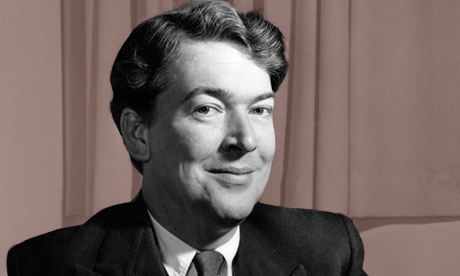
Below, Kingsley Amis responds to Donald Davie’s “Hobbits and Intellectuals,” which took a previous piece by Amis (about a political dispute with a pseudonymous “R”), and the huge popularity of Tolkien’s Lord of the Rings trilogy as starting points for a lengthy and critical discussion about contemporary British intellectuals—among whom, of course, Amis figured prominently. Davie had written that Amis’ dispute with “R” had “the British hall-mark…which shows most clearly how it’s all in the family, indeed only a quarrel at the parish-pump. They both ‘like it here’; and their liking it so well is what makes their disagreements only shadow play, however much they huff and bitch at each other.” (Davie, due to his distaste for British foreign policy, had left a professorship at the University of Essex for self-imposed exile at Stanford University.)
December, 1969, London
To The Editor, Encounter—
I am not sure I got the total hang of Donald Davie’s “Hobbits and Intellectuals” piece. To begin near its beginning: I cannot really see why a polemicist (like me) should not be taken seriously unless he gets too angry to want to go on living in his own country. This would hardly do as a general rule. Neither can I see how Davie can consider himself no less good a patriot than myself (or R), “perhaps a better,” when he says he doesn’t like it here and takes off. He is not in Kuznetsov’s situation.
But these are small puzzles, and I think I understand his later, major metaphor about Creon, the person willingly in authority, versus Antigone, the person in perpetual opposition who is too spiritually grand ever to accept power and its corrupting temptations and whom he equates with my figure of the Lefty. I even agree with some of this, and am glad to find that Davie doesn’t seem to like Lefties any more than I do. However, there are a couple of points, closely related, that I should like to take up first.
Davie is being a little perverse when he says what a good thing, in international politics, a “loss of nerve” can be. Such a failure would not have helped us, or the world, much in 1805 or 1940. (I am prepared to argue about 1914.) Anyway, what Davie had to say on this topic has been overtaken by events, and as I write—just after Moratorium Day—we can view a loss of nerve on a scale and at a depth and with a chain of possible consequences spectacular enough to satisfy even him, I hope.
He also says he differs from me about “the alleged monolith of Communism.” The notion that Communism is not monolithic and that this somehow makes a difference is actually a favourite crypto-neo-post Lefty one. Various simple answers to it suggest themselves. One is that Fascism, as practised in Germany, Italy and Japan was a good deal less monolithic than Communism has ever been and still managed to be both very unpleasant and very dangerous. Another is that it doesn’t much matter to me whether a Communist gets at me with the bastinado or the knout, a missile or a machete—all that really divides them is how to bury us, as (or roughly as) John Kennedy put it. Perhaps Davie would deny that Communism is always and everywhere tyrannical and, whenever it thinks it can get away with it, aggressive as well: Korea, Malaya, Viet Nam, Hungary, Czechoslovakia, etc. It will have to get a bloody sight more polylithic than it is before I start treating different bits of it differently enough to make a difference.
Now to Creon and Antigone. “If Communism is not monolithic, neither is ‘protest,’” says Davie. Well, protest isn’t monolithic, no, whatever Leftists may pretend, and here is a serious weakness in the Antigone idea—it doesn’t apply in enough cases. There is no evidence that the Russian protesters would refuse office of authority in a civilised Russia, as proper Antigones would; they might, and then again they might not. There is no evidence, to say the least, that none of our student rioters and their faculty accomplices are interested in power, and their heroes—Guevara, Castro, Ho, Mao—are Creon-men to a man. (Marcuse, largely unread, of course, is just a chap in an Establishment post who, so to speak, proves the rule, a Dean of Canterbury figure, or perhaps more closely analogous, in a different sphere, to Shakespeare or Michelangelo as they used to feature, when the hand of repression was heavier, in those self-justifying lists of great queers of history that ordinary queers used to carry about.)
Just as the trouble with Creon in all sorts of his incarnations—university administrator, educationist, Arts Council committee member, and whoever chose the new editor of the Radio Times—is that he has become worm-eaten with Antigonism, so the genuine Antigones, of whom there are probably a few left, have become infiltrated with little Creons. The latter will never actually attain the power they seek; if they ever get near it they will be gobbled up by the big Creons who know their business, just as in 1917. Those are the people who frighten me. And I don’t care whether they turn out to be Stalinist or Brezhnevite or Maoist or Ho-ist or Castro-ite or Hoxha-ite (or Hitlerite) or whatever. As I said, it doesn’t make enough difference.
Kingsley Amis
+


